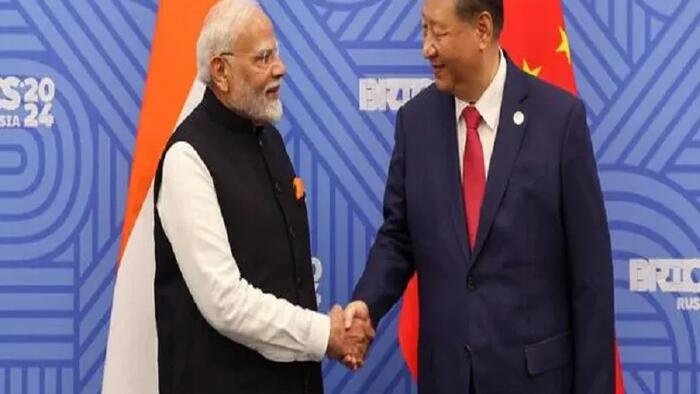Authored by Andrew Korybko via Substack,
India announced earlier this week that it and China agreed to patrol their disputed border area in the way that it was before June 2020’s lethal Galwan River Valley clashes. This was made possible by China finally complying with India’s long-standing request, which in turn paved the way for their leaders to hold a bilateral meeting on the sidelines of this week’s BRICS Summit in Kazan. What many don’t realize, however, is that the US was inadvertently responsible for facilitating their deal.
This analysis here from early May explains how summer 2023’s scandal about an alleged Indian assassination attempt against a Delhi-designated terrorist-separatist with dual American citizenship on US soil was a turning point in their ties. The US then continued with its good cop, bad cop game against India prior to pushing Canada to escalate its related dispute with India earlier this month. Even before the latest developments, however, Indo-US ties had already noticeably soured over this issue.
India and China held multiple rounds of talks on their disputed border since 2020, but no breakthrough had occurred until Indo-US ties became characterized by distrust as a result of summer 2023’s scandal and all that followed. China realized that those two’s previous level of trust will never return, which assuaged its concerns that India is playing a leading role in the US’ containment policy. It was this shift in perceptions that then led to China reconsidering its informal policy towards their border dispute.
China had been reluctant to return to the status quo ante bellum since this was seen as a unilateral concession that could signal weakness and worsen its hand in the South China Sea. The drastic downturn in Indo-US ties, however, led to the aforesaid being perceived as a pragmatic means for managing the abovementioned concerns about India containing China in coordination with the US. The improvement of Sino-Indo ties could therefore place limits on the future improvement of Indo-US ones.
Finally complying with India’s long-standing request for resolving their post-Galwan tensions and consequently placing their partnership back on track amidst the dramatic downturn in Indo-US ties could preclude the possibility of India participating in the US’ containment scheme. No improvement in Indo-US ties would occur at the expense of Sino-US ones if that happens after this sensitive problem is finally patched up by then and India thus no longer has the same threat perception of China as before.
China and India have natural economic complementarities, and if the world’s two largest countries ever found a way to unleash their full mutual potential upon resolving their sensitive territorial issues and correspondingly restoring mutual trust, then global affairs would begin to revolve around them. That’s why the US has sought to divide-and-rule them through information warfare and its Kissingerian “triangulation” policy, but this failed after it went too far pressuring India over summer 2023’s scandal.
About that, the US never respected India as an equal partner and instead sought to subjugate it as a vassal by demanding that India comply with the West’s unilateral sanctions against Russia, which was unacceptable for both economic and principled reasons. The US also feared India’s astronomical rise as a Great Power since the start of the special operation, fueled to a large degree by discounted Russian energy, since this accelerated multipolar processes to the detriment of its unipolar hegemony.
That explains why it exploited summer 2023’s scandal to worsen their ties, meddled in this year’s earlier general elections, and even helped overthrow the Bangladeshi government a few months ago in order to pressure India into complying with these demands and then punishing it when this didn’t happen. Military and trade ties remain stable for now, but it can’t be taken for granted from India’s perspective that this will remain the case as their political ties continue to deteriorate over summer 2023’s scandal.
They can quietly manage their competition in Bangladesh and try to find a modus vivendi there, while the US’ meddling wasn’t direct nor intense enough like in other elections to seriously worsen their ties, which is why summer 2023’s scandal remains the most troublesome of their disputes. Instead of letting it subside, the US continues exacerbating it at periodic intervals, both on its own and via its Canadian proxy. This informed India that the US has malicious intentions and can never be fully trusted again.
Accordingly, India was therefore pleased that China finally decided to comply with its long-standing request for resolving their post-Galwan tensions and getting bilateral ties back on track, which showed the US that India will never become its vassal. Additionally, India also demonstrated that it’s influential enough to further accelerate multipolar processes to the detriment of the US’ unipolar hegemony as revenge for being mistreated, though its wayward partner still might not change its ways.
Even on the off chance that it does, the mutual trust that used to characterize their ties before summer 2023’s scandal will never return, thus ruling out the possibility that India will contain China in coordination with the US in the future. This is especially so after China just removed the primary irritant in their relations over the past four years that was responsible for driving the military dimension of Indo-US ties that prompted the People’s Republic to speculate that India was trying to contain it with the US.
In retrospect and provided that the incipient Sino-Indo rapprochement continues, the US’ pressure campaign against India might be seen as a game-changer due to how tremendously it’s poised to reshape the global systemic transition’s strategic dynamics. The meaningful improvement of Sino-Indo relations could lead them closer to unlocking their full mutual potential, which would revolutionize International Relations if successful and thus bring an even swifter end to the US’ unipolar hegemony.
Loading…

